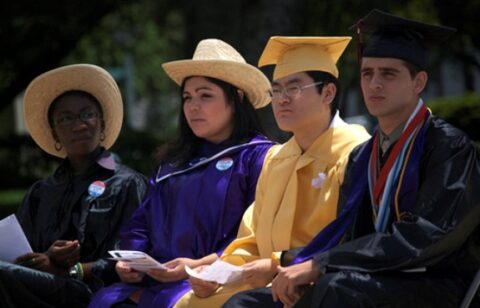State and Local

Justice Department Says Alabama Immigration Law Disrupts Access to Public Education
While eyes remain fixed on the Alabama legislature’s effort to revise their immigration enforcement law, HB 56, the U.S. Department of Justice informed state officials in a letter last week that the state’s immigration law has resulted in significantly higher absence rates among Latino students. According to the letter, more than 13 percent of Latino schoolchildren in Alabama withdrew from classes between the start of the school year and February 2012. While the Department’s investigation is still ongoing, the letter said Alabama could lose federal funding and face additional litigation if it fails to revoke a provision of HB 56 that requires administrators to determine the immigration status of newly enrolling students. Read More

Changes to Alabama’s Extreme Immigration Law Not Enough, Critics Say
Following numerous protests, lawsuits, damaging economic reports and problems enforcing the law, Alabama Rep. Micky Hammon of Decatur proposed a bill (HB 658) that tweaks key provisions of the state’s immigration enforcement law, HB 56. Last week, the Alabama House approved those changes, some of which scaled back provisions of the law and others which actaully expanded existing provisions. While Rep. Hammon claims the tweak bill “removes confusing language and makes the law easier to enforce,” opponents assert that no amount of tweaking can fix this broken law and that the only solution is a full repeal. HB 658 is now pending in the state Senate which is expected to take up the bill this week. Read More

Study Shows Self-Deportation is Irrational Behavior and a False Premise
Proponents of “attrition through enforcement” would have you believe that, given the right conditions, unauthorized immigrants will choose to leave the U.S. and return to their home countries. The Myth of Self Deportation, by Alexandra Filindra, questions the assumptions behind the attrition strategy and concludes that self-deportation is not rational because unauthorized immigrants have invested too much in the U.S. to return home. Read More

SB1070 Author Shares Fears About America Becoming a “Minority, Majority” Nation
On the same day the Supreme Court heard oral arguments in Arizona v. United States the Washington Post published an article featuring Michael Hethmon, general counsel for the Immigration Reform Law Institute. Hethmon is the lesser-known legal mind behind SB1070, and a variety of other anti-immigrant measures. His legal counterpart, Kris Kobach tends to get the spotlight; however Hethmon didn’t shy away from the Washington Post this week and was frank about his views on the real issues underlying SB1070. Read More

Nebraska Upholds Bill that Provides Prenatal Care to Undocumented Women
In a move that brought together an unusual group of allies, Nebraska’s Republican-controlled legislature recently upheld a bill that allows undocumented pregnant women to access state-funded prenatal care, overriding a veto by Republican Governor Dave Heineman. Nebraska Right to Life, Nebraska Catholic Conference, Planned Parenthood, and Nebraska Appleseed actually came together to support LB599, a bill the governor worked hard to kill. Why would Gov. Heineman, a man who describes himself as the one of the most pro life governors in America, oppose a bill that helps protect unborn children? Because, as the New York Times put it, he believes “government-financed health care for poor women is an acceptable thing, unless the women were in violation of immigration laws, in which case it was a terrible waste of taxpayer dollars.” Read More

Supreme Court Asks Hard Questions at Oral Arguments Over Arizona SB 1070
Almost two years to the day after Arizona enacted the notorious immigration law known as SB 1070, the Supreme Court heard arguments in what could be the first of many cases over the validity of the measure. Although most critics of the law have focused on its potential for civil rights violations, the only question before the Justices was whether federal immigration laws “preempt” four provisions of SB 1070 that were blocked by lower courts. While the ultimate fate of those provisions will not be known until a ruling is announced, a few preliminary observations can be made based on the questions posed by the Justices. Read More

Five Things to Know Before the Supreme Court Hears Arguments on Arizona SB1070
In less than 48 hours, the Supreme Court will hear oral arguments in Arizona v. United States, the long-anticipated dispute over the legality of SB 1070. More than any case in recent history, the dispute raises fundamental questions about the role of states in the enforcement of federal immigration law. The Court’s decision could thus determine not only the future of SB 1070, but the fate of other state immigration laws being challenged in court and the odds of similar laws being passed around the country. While much ink has already been spilled about the case, below we’ve highlighted five important facts to remember before the argument. Read More

FAIR’s Economic Analysis of HB56 Ignores Reality in Alabama
While the original sponsors of Alabama’s extreme anti-immigrant bill HB56 have acknowledged that the law is deeply flawed, as evidenced by a new bill to modify some of the harsher provisions, the restrictionist stalwarts at the Federation for American Immigration Reform (FAIR) want Alabamians to remember what it has supposedly done for the state. In a recent article, FAIR continues to make the unsubstantiated claim that HB56 is exactly what Alabama’s economy and workers need. It does this by using its trademark technique of pitting Alabama’s native-born workers against immigrants and their children, many of whom are U.S. citizens. Read More

Colorado, Hawaii and Delaware Progress on Tuition Equity for Undocumented Students
Legislation intended to make college education more affordable for undocumented students continues to work its way through state legislature across the U.S. Last week, the Colorado Senate approved SB 15 (or ASSET), a tuition equity bill that would provide a standard tuition rate to qualifying students regardless of immigration status. Likewise, bills in Hawaii and Delaware which provide in-state tuition and financial aid to eligible students regardless of status are also moving through their respective legislatures. Currently, twelve states have laws on their books that permit certain undocumented students who have attended and graduated from their primary and secondary schools to pay the same tuition as their classmates at public institutions of higher education. Read More

Alabama Lawmakers Propose Extensive Changes to State’s Immigration Law, HB 56
Yesterday evening, lawmakers in Alabama introduced a bill proposing extensive changes to HB 56, the state’s notorious immigration enforcement law. The proposed bill follows extensive criticism from civil and immigrants’ rights leaders about HB 56, as well as numerous lawsuits that prevented more than a dozen of the law’s provisions from taking effect. While passage of the proposed bill—dubbed HB 658—may not reduce the anti-immigrant climate in Alabama, many of the amendments would modify what are widely seen as the most pernicious aspects of the law. Read More
Make a contribution
Make a direct impact on the lives of immigrants.
